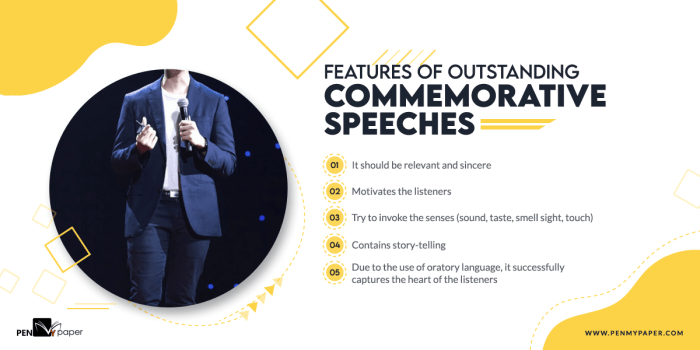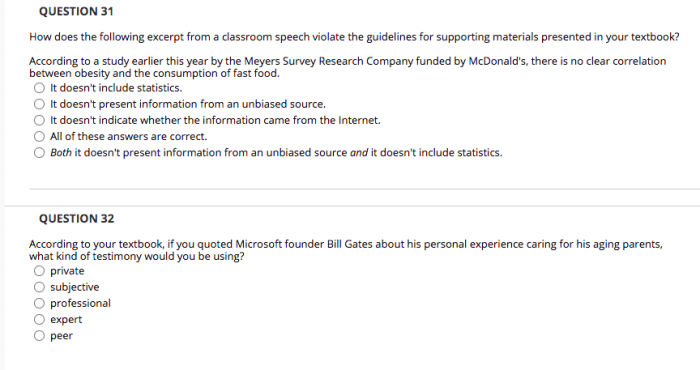According to your textbook a commemorative speech – According to your textbook, a commemorative speech is a special type of address that celebrates or remembers a person, event, or anniversary. These speeches serve a significant purpose, conveying a message of remembrance, tribute, or inspiration. Understanding the key characteristics, types, structure, and delivery techniques of commemorative speeches is essential for effectively crafting and delivering such addresses.
Commemorative speeches take various forms, including eulogies, anniversary speeches, and dedications. Each type has its unique purpose and features. Whether honoring a departed loved one or marking a milestone, commemorative speeches offer a powerful platform to express gratitude, share memories, and inspire reflection.
1. Introduction to Commemorative Speeches

Commemorative speeches are a type of speech that is delivered to honor or remember a person, event, or anniversary. They are often given at special occasions, such as birthdays, anniversaries, or memorial services.
The purpose of a commemorative speech is to celebrate the life or achievements of the person or event being honored. They can also be used to inspire the audience or to call them to action.
Key Characteristics and Elements of a Commemorative Speech
- A clear and concise introduction that states the purpose of the speech.
- A body that provides information about the person or event being honored.
- A conclusion that summarizes the speech and leaves the audience with a lasting impression.
- Appropriate use of language and tone.
- Effective use of anecdotes and examples.
2. Types of Commemorative Speeches
Eulogies
Eulogies are speeches that are delivered at funerals or memorial services. They are typically given by a close friend or family member of the deceased.
Anniversary Speeches
Anniversary speeches are speeches that are delivered to celebrate the anniversary of an event. They can be given by anyone, but they are often given by the person who was involved in the event.
Dedications
Dedications are speeches that are delivered to dedicate a building, statue, or other object to a person or event. They are typically given by a person who is involved in the project.
3. Structure and Organization of Commemorative Speeches

The structure of a commemorative speech can vary depending on the type of speech being given. However, there are some general guidelines that can be followed.
Introduction
The introduction should be clear and concise. It should state the purpose of the speech and provide some background information on the person or event being honored.
Body
The body of the speech should provide information about the person or event being honored. This can include biographical information, details about the event, or personal anecdotes.
Conclusion
The conclusion should summarize the speech and leave the audience with a lasting impression. It can include a call to action or a final thought.
4. Content and Language of Commemorative Speeches
The content of a commemorative speech should be appropriate for the occasion. It should be respectful and avoid using offensive or controversial language.
Appropriate Language, According to your textbook a commemorative speech
The language used in a commemorative speech should be formal and appropriate for the occasion. It should be clear and concise, and it should avoid using slang or jargon.
Anecdotes and Examples
Anecdotes and examples can be used to illustrate the points being made in the speech. They can also be used to make the speech more personal and engaging.
5. Techniques for Engaging the Audience
There are a number of techniques that can be used to engage the audience in a commemorative speech. These techniques include:
Storytelling
Storytelling is a powerful way to connect with the audience. It can be used to illustrate the points being made in the speech or to make the speech more personal and engaging.
Humor
Humor can be used to lighten the mood of the speech and to make it more enjoyable for the audience. However, it is important to use humor appropriately and to avoid making jokes that could be offensive or disrespectful.
Personal Experiences
Personal experiences can be used to make the speech more personal and relatable. They can also be used to illustrate the points being made in the speech.
6. Delivery and Performance of Commemorative Speeches

The delivery of a commemorative speech is just as important as the content. The speaker should be clear and concise, and they should use appropriate body language and eye contact.
Voice Projection
The speaker should project their voice so that the audience can hear them clearly. They should also avoid speaking too quickly or too slowly.
Body Language
The speaker’s body language should be open and inviting. They should make eye contact with the audience and avoid using distracting gestures.
Eye Contact
Eye contact is essential for connecting with the audience. The speaker should make eye contact with different members of the audience throughout the speech.
7. Examples and Case Studies: According To Your Textbook A Commemorative Speech

There are many examples of well-crafted commemorative speeches. Some of the most famous examples include:
Abraham Lincoln’s Gettysburg Address
Lincoln’s Gettysburg Address is one of the most famous speeches in American history. It was delivered at the dedication of the Soldiers’ National Cemetery in Gettysburg, Pennsylvania, on November 19, 1863.
Martin Luther King Jr.’s “I Have a Dream” speech
King’s “I Have a Dream” speech is one of the most famous speeches in American history. It was delivered at the March on Washington for Jobs and Freedom on August 28, 1963.
Barack Obama’s Inaugural Address
Obama’s Inaugural Address is one of the most famous speeches in American history. It was delivered at his inauguration as the 44th President of the United States on January 20, 2009.
Essential FAQs
What is the main purpose of a commemorative speech?
The primary purpose of a commemorative speech is to honor, remember, or celebrate a person, event, or anniversary.
What are the key elements of a commemorative speech?
Key elements of a commemorative speech include a clear introduction, a well-organized body with supporting anecdotes and examples, and a powerful conclusion that leaves a lasting impression.
What are some common types of commemorative speeches?
Common types of commemorative speeches include eulogies, anniversary speeches, and dedications.